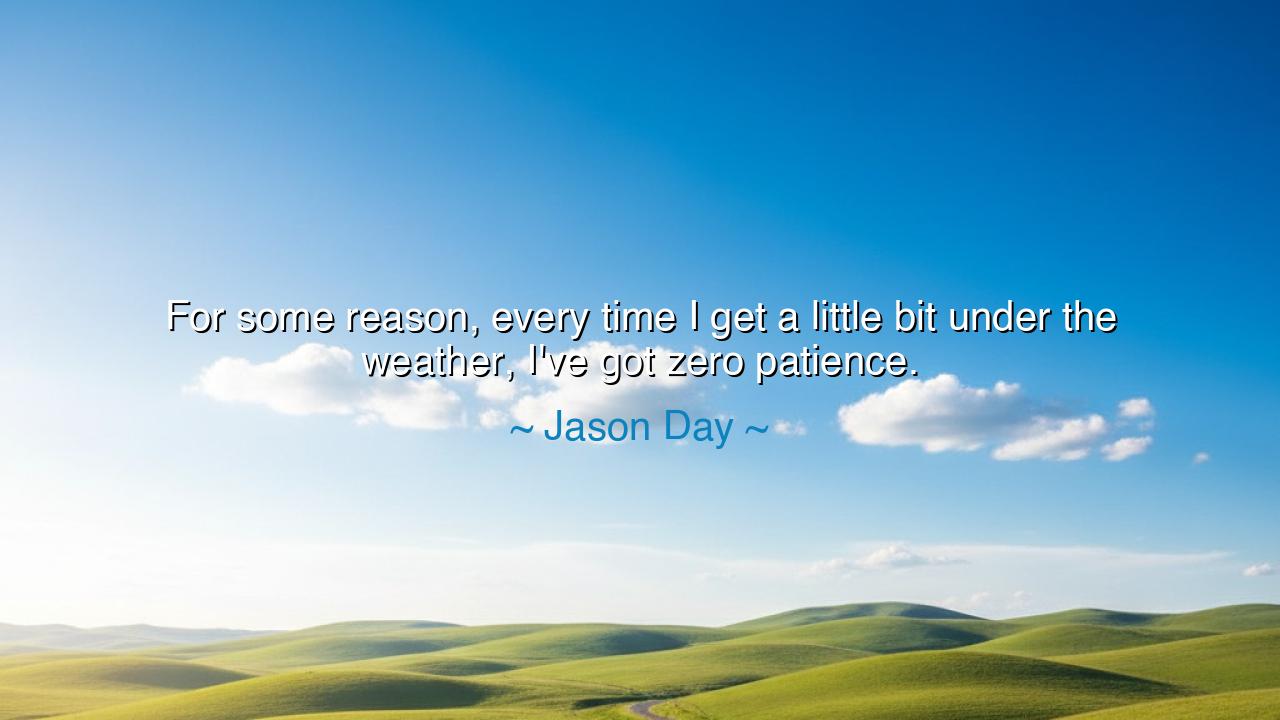
For some reason, every time I get a little bit under the
For some reason, every time I get a little bit under the weather, I've got zero patience.






In the words of Jason Day, the great golfer, we hear this humble confession: “For some reason, every time I get a little bit under the weather, I've got zero patience.” Though simple, these words hold a mirror to the fragility of the human spirit. When the body is weakened, the mind too is shaken, and virtues that once seemed steady crumble like sand before the tide. Patience, that noble guardian of the soul, flees swiftly when pain or illness presses upon us. This truth is not spoken only for Day himself, but for all mortals, for it is a universal battle—the struggle between weakness and will.
In the ancient days, wise teachers proclaimed that the state of the flesh influences the state of the spirit. When warriors fell sick before battle, their courage grew thin, not because their hearts failed them, but because the burden of the body weighed down their resolve. To be “under the weather” is to find oneself bound by chains unseen, for the body is the vessel of the soul, and when the vessel leaks, even the brightest flame within flickers low. Thus, Day’s lament echoes the wisdom of the ancients: one must learn to guard the mind when the body falters, lest impatience and bitterness consume us.
Consider the story of Alexander the Great, who, at the height of his conquests, was struck by fever in Babylon. His armies trembled, for their leader was laid low, his strength diminished. In those hours, it was said Alexander grew restless, irritable, and demanding, as if the mighty conqueror himself could not endure the frailty of sickness. And yet, this too was his humanity unveiled. Even the great are not spared the truth Jason Day has voiced: that illness unmasks impatience, revealing that beneath our victories and crowns, we are all vulnerable.
Yet, there lies a deeper lesson: impatience itself is not the enemy, but a messenger. It warns us of imbalance. When we fall sick, impatience arises because the world no longer bends to our command. Our plans stumble, our control is broken, and our pride suffers. Impatience is the cry of the ego wounded by limitation. To understand this is to begin mastering it. For in recognizing the cause, one can choose a different path—not the path of surrender to anger, but the path of humility, rest, and quiet endurance.
Hear also the tale of Marcus Aurelius, the philosopher-king. Tormented by constant ailments throughout his reign, he wrote in his Meditations that one must remember the fleeting nature of both pain and life itself. Instead of raging against his weakness, he counseled himself toward calm acceptance. Though his body faltered, his words endure like marble. In this, we see a different response to the same trial Jason Day confesses: the emperor, though ill, sought not impatience but stillness, using the flame of wisdom to light the darkness of suffering.
Therefore, let us take Day’s words not merely as confession but as a teaching. When we are struck by weakness—whether by fever, fatigue, or sorrow—we must expect impatience to rise, and we must prepare the heart to meet it with compassion. Do not condemn yourself for impatience; rather, see it as a call to slow down, to honor the body, to release the illusion of control.
In practice, when you find yourself under the weather, take three actions: first, breathe deeply and accept the moment without judgment. Second, speak kindly to yourself, for impatience thrives where harshness grows. Third, extend grace to others, even when your strength is thin, for the way you treat others in weakness reveals the true depth of your character. In this way, your illness becomes not merely a trial but a teacher, shaping you into one who can endure both sickness and health with dignity.
Thus, remember Jason Day’s words as both a warning and a guide. To be under the weather is to walk the edge of patience, but to master oneself in those moments is to rise above the storm. The body may falter, but the spirit, if trained in humility and gentleness, can yet remain unbroken. And so, dear listener, carry this wisdom: illness reveals impatience, but wisdom restores peace.






AAdministratorAdministrator
Welcome, honored guests. Please leave a comment, we will respond soon